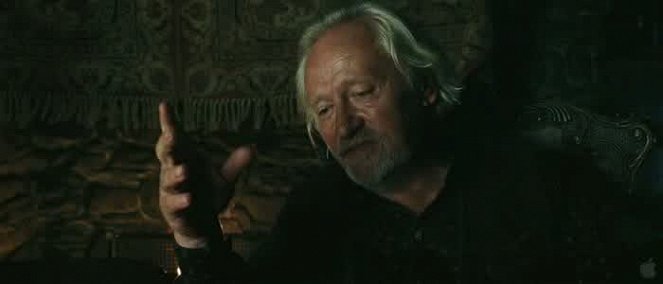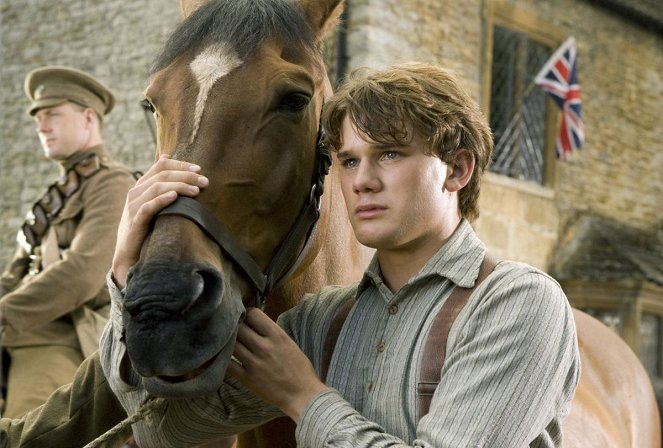Directed by:
Steven SpielbergCinematography:
Janusz KaminskiComposer:
John WilliamsCast:
Jeremy Irvine, David Thewlis, Emily Watson, Tom Hiddleston, David Kross, Benedict Cumberbatch, Peter Mullan, Niels Arestrup, Patrick Kennedy, Nicolas Bro (more)VOD (4)
Plots(1)
Set against a sweeping canvas of rural England and Europe during the First World War, War Horse begins with the remarkable friendship between a horse named Joey and a young man called Albert, who tames and trains him. When they are forcefully parted, the film follows Joey’s the extraordinary journey as he moves through the war, changing and inspiring the lives of all those he meets – British cavalry, German soldiers and a French farmer and his granddaughter – before the story reaches its emotional climax in the heart of No Man’s Land. (Walt Disney Studios Home Entertainment)
(more)Videos (54)
Reviews (12)
A much more unbearable film than I could have ever expected. Technically speaking, it’s good, of course, but the dialogues are a pain to listen to, the main characters are unlikeable (all of them, and the main teenage redneck most of all), the story is driven by either chance or the stupidity of the characters, and the whole lot is so awfully pathetic and kitsch that it made my head spin. I think the world around us is full of better stories and I don’t understand why anyone should care whether one mare will be reunited with an unlikeable young guy or not. And, if the animal in this film intentionally and consciously (!!!) sacrifices itself in order to help its friend, and people actually believe it and are moved by it… something is bloody wrong in this world. It’s been long since something pissed me off so much. Two stars for the technical aspect, but unfortunately, Spielberg is no longer guarantee of quality mainstream entertainment.
()
The depiction of an animal’s suffering at the hands of a person marks War Horse as a cousin of Bresson’s Balthazar, while the relay narrative structure is reminiscent of Jancsó’s The Red and the White. I realise that these are wild comparisons that I should tone down in time, but I still consider Spielberg’s latest film to be not only a return to the narrative tradition of the classic Hollywood of Victor Fleming and John Ford (references to westerns can be seen in the development of the theme of tradition vs. modernity and the cavalry charge against the German camp, reminiscent of Indian attacks), but (paradoxically) also a remarkable narrative experiment. The plot seems simple at first and I imagined the ease with which the screenwriter “sold” it to the producer (there’s a horse, there’s a boy, there’s a war), but opening the gate dividing the small world of family conflicts from the big world of war gives the story an unexpected boost. The supposed protagonist is sidelined and the film atypically takes on the horse’s point of view, for which we are gently prepared in advance by the emphasis placed on the other animals. The father-son drama in the background of the class conflict transforms into a patriotic drama, which later turns into a war story about friendship, and there is even a comedic episode to lighten the mood. All of the outwardly stylistically incongruous events are linked by the two words contained in the title: war and horse. However, the film doesn’t show war with the hyperrealism of Saving Private Ryan, but rather presents to us an admittedly distorted, almost childishly naïve version of war (the kitschy image of the sky like that seen in old Technicolor melodramas). We are given advance warning of death through meaningful shots and Spielberg softens the painful scenes (the execution) with masterful visual and sound shortcuts (though these are somewhat obvious in his directing), and the battle scenes are filmed predominantly in long shots rather than in close-ups, which would have revealed more. The idea of war is not subjected to direct criticism (as perhaps in no other American film) but is rather shown as an inevitability. The bloody global conflict serves to push the touching narrative to humanistic extremes (rescuing the horse would have resulted in two absurd sketches). Spielberg openly uses the inhumanity of war to reveal the humanity of the heroes. War Horse basically says, “life is a struggle, but you will win it”. That may seem ridiculous today, when even a lot of Hollywood films slowly vacillate and doubt, but Spielberg is still able to present it with a certain magnificence that in the delayed conclusion will give you a feeling of being victorious (as usual, it will take a while to re-establish your equilibrium after the preceding shocks). If you let it. 75%
()
War Horse follows in the footsteps of The Red Baron and the Flyboys. A wave of renewed interest in WW1 would be a great thing, it would just have to be based on films that aren't such failures. The memory of Düsseldorf will be more eternal and colorful than a sunset in all shades of orange.
()
A nostalgic look back to the heartiest, most melodramatic stage of cinematography. Film poetry for people who remember those times, maybe the last of its kind. Had it been twenty minutes shorter, it would have been one of Steven Spielberg’s best movies. That it’s one of his most personal films can be felt from every scene.
()
This is a pretty special movie for me and I must say that I really enjoyed it. Spielberg filmed this in his own way and it ended up so that every scene looks like a poster. Some scenes stand out incredibly. The ride through the battlefield is the most powerful scene of the movie, thanks to John Williams’ music too. Sometimes maybe half of the good feeling from the movie comes from the somebody sitting next to you.
()



Ads